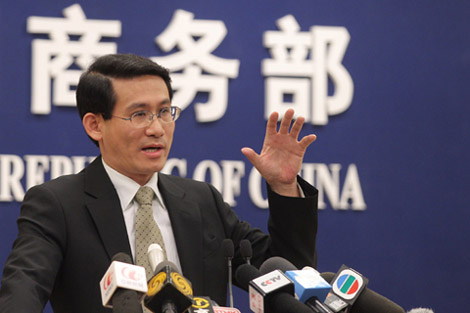Japanese direct investment in China dropped 25.1 percent year-on-year in the first 10 months this year, after declining 38.8 percent in 2014 on a yearly basis, the Ministry of Commerce (MOFCOM) said on Tuesday.
本周二,中国商务部表示,2014年全年,日本在华投资下降了38.8%,与上年同期数字相比,今年前10个月里,日本在华投资额下跌了25.1%。
Over the last two years, Japan's direct investment in China has been on a downward trend, partly because of the external economic environment and also problems at Japanese enterprises, Shen Danyang, spokesman for MOFCOM said at a regular press conference on Tuesday.
商务部发言人沈丹阳在本周二的例行记者招待会上说道,在过去两年里,日本在华直接投资呈下滑趋势,一定程度上是由于外部经济环境和日本企业自身问题而导致的。
The depreciation of the Japanese yen has made it more difficult for Japanese enterprises to expand their business in China, Shen said at the press conference.
沈丹阳在记者招待会上表示,日元贬值使日本企业要想扩大在华经济业务难上加难。

Jin Baisong, a research fellow at the Chinese Academy of International Trade and Economic Cooperation, agreed with Shen. "The depreciation of the yen and appreciation of the yuan has made it costlier for Japanese companies to run their businesses in China," Jin told the Global Times on Tuesday.
金柏松是中国国际贸易和经济合作科学院的研究人员,他表示同意沈丹阳的看法。金在本周二告诉环球时报,日元贬值,人民币升值,致使日本企业在华经营成本更高。
This means that export-oriented Japanese companies are now less competitive in the Chinese market, Jin said.
金表示,这意味着现在出口导向型日本企业在中国市场竞争力较弱。
Some Japanese companies have also adopted a wait-and-see attitude toward the Chinese market as they have some concerns over economic development in China, Shen said.
沈表示,一些日本企业对中国经济发展有些许担忧,所以他们对中国市场持观望态度。
China's economy has entered a "new normal" period with slower economic growth, and labor and land use costs are still rising, Shen noted.
沈指出,中国经济已进入到一种“新常态”时期,即经济增长放缓、劳力和土地使用成本仍在上涨。
Japan has a long history of investing in China, and many Japanese companies set up branches in China years ago, but they are now facing intensified competition from domestic companies as well as firms from other countries, Shen noted, adding that some Japanese companies with lower technology have been forced out of the Chinese market.
沈说道,日本在华投资历史悠久,许多日本公司多年前就已在中国建立分公司,但现在他们同时面临来自中国本土以及其他国家公司的激烈竞争。沈补充道,一些低端技术企业被迫退出中国市场。
The sharp drop in Japanese direct investment in China also partly reflects soured bilateral relations over territorial and wartime historical issues, Jin said, and this could continue to be "one of the factors limiting Japanese direct investment in China."
金表示,日本在华投资的大幅下跌也部分反应了两国因领土和战时历史问题而恶化的关系,这也将继续成为“抑制日本在华直接投资的因素之一。”
However, a reduction in some countries' direct investment in China is "a normal phenomenon" and simply a strategic adjustment when faced with rising costs, Chen Fengying, a research fellow with the China Institutes of Contemporary International Relations, told the Global Times on Tuesday.
陈凤英是中国现代国际关系研究院的研究员,他在本周二告诉环球时报,一些国家减少在华直接投资属“正常现象”,这是当面对成本上涨,一个战略上的调节而已。
"In the past, China gave some privileges such as tax breaks to foreign companies in order to attract their investment. But now, China is starting to treat domestic and foreign companies equally," Chen said.
陈说道:“过去,为了吸引外资,中国会给予外资企业一些特权,比如外资企业税收优惠。但现在,中国开始平等对待国内和外资企业。”
Direct investment in China from the US also declined during the first 10 months, with a drop of 13.6 percent year-on-year, according to a statement released by MOFCOM on November 11.
根据商务部11月11日发布的一份声明显示,与上年同期数字相比,在前10个月里,美国在华直接投资也下降了13.6%。
However, investment from ASEAN, the European Union, and from countries and regions along the "Belt and Road" initiative continued to grow, MOFCOM said.
商务部表示,但东南亚国家联盟、欧盟和“一带一路”沿途国家地区的投资额继续呈增长态势。
Chen also noted that Japanese companies will not give up on the Chinese market, adding that foreign investment in the domestic services and high-tech manufacturing sectors is growing strongly.
陈同样表示,日本企业不会放弃中国市场,并补充道,在国内服务和高科技制造业领域,外国投资正强劲增长。
In the first 10 months, foreign investment in the domestic services sector increased 19.4 percent, and in the high-tech services sector it rose by 57.5 percent to $6.76 billion, according to MOFCOM
根据商务部显示,在前10个月里,国内服务行业的外国投资增长了19.4%,高科技服务业的国外投资上升了57.5%,达到67.6亿美元。













